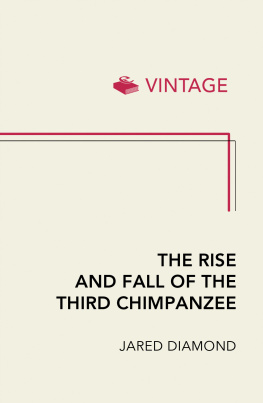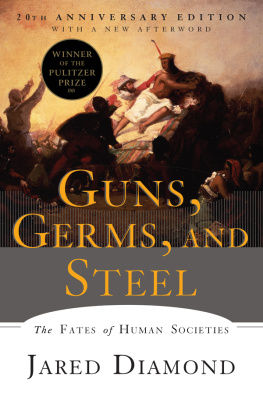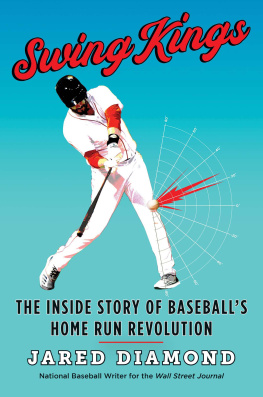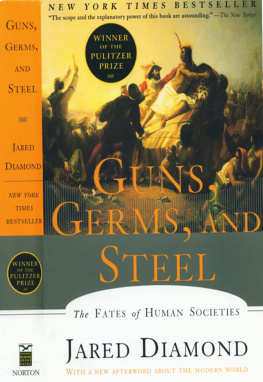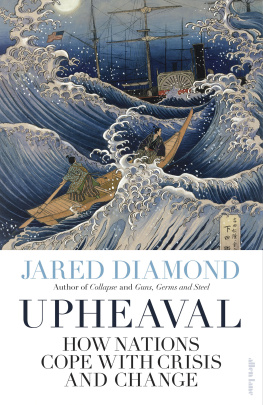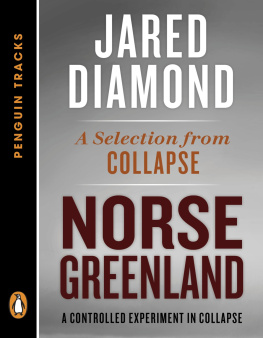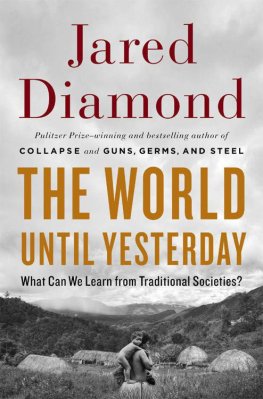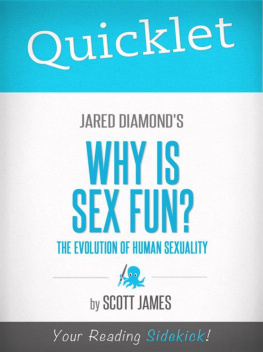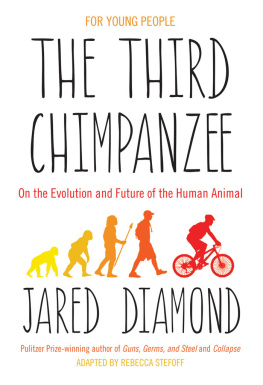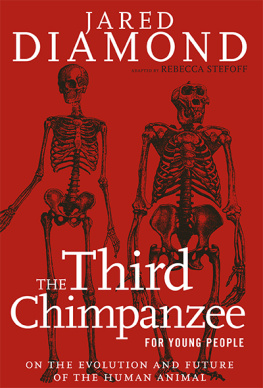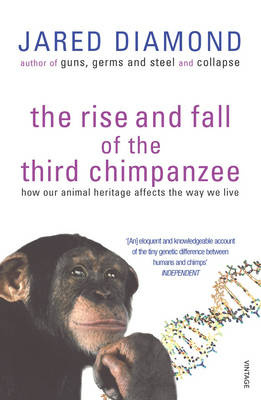Jared Diamond - Why Is Sex Fun?: The Evolution Of Human Sexuality (Science Masters)
Here you can read online Jared Diamond - Why Is Sex Fun?: The Evolution Of Human Sexuality (Science Masters) full text of the book (entire story) in english for free. Download pdf and epub, get meaning, cover and reviews about this ebook. year: 1998, publisher: Basic Books, genre: Romance novel. Description of the work, (preface) as well as reviews are available. Best literature library LitArk.com created for fans of good reading and offers a wide selection of genres:
Romance novel
Science fiction
Adventure
Detective
Science
History
Home and family
Prose
Art
Politics
Computer
Non-fiction
Religion
Business
Children
Humor
Choose a favorite category and find really read worthwhile books. Enjoy immersion in the world of imagination, feel the emotions of the characters or learn something new for yourself, make an fascinating discovery.

- Book:Why Is Sex Fun?: The Evolution Of Human Sexuality (Science Masters)
- Author:
- Publisher:Basic Books
- Genre:
- Year:1998
- Rating:4 / 5
- Favourites:Add to favourites
- Your mark:
- 80
- 1
- 2
- 3
- 4
- 5
Why Is Sex Fun?: The Evolution Of Human Sexuality (Science Masters): summary, description and annotation
We offer to read an annotation, description, summary or preface (depends on what the author of the book "Why Is Sex Fun?: The Evolution Of Human Sexuality (Science Masters)" wrote himself). If you haven't found the necessary information about the book — write in the comments, we will try to find it.
Why Is Sex Fun?: The Evolution Of Human Sexuality (Science Masters) — read online for free the complete book (whole text) full work
Below is the text of the book, divided by pages. System saving the place of the last page read, allows you to conveniently read the book "Why Is Sex Fun?: The Evolution Of Human Sexuality (Science Masters)" online for free, without having to search again every time where you left off. Put a bookmark, and you can go to the page where you finished reading at any time.
Font size:
Interval:
Bookmark:
Why is Sex Fun? is the best book on the subject I've read. This lively exploration of our sexual heritage offers fascinating reading for anyone curious about why lovers do what they do.
Diane Ackerman, author of A Natural History of the Senses
I am so jealous of Jared Diamond, for he writes with such an elegant simplicity! Here, he takes a loot at the endlessly fascinating topic of human sexuality His convincing arguments should persuade xm that there are very special reasons why we evolved to use sex for recreation as well as for procreatim whereas most other mammals are denied that pleasure. It is a great little book, by one of the worlds foremost biological philosophers.
Roger Shohl, Professor of Physiology Monash University Australia
Once again Jared Diamond provides us with answers to questions we may never have stopped to ask, but wish we had. In this long essay Diamond explains that recreational sex, while not unique to humans, is a rare behavior in the animal world. Above all, we learn, sexual activity divorced fron procreation is not only part of what it is to be human, but the very crux of our evolutionary success.
Bettyaxn Kevles, author of Naked to the Bonn Medical Imaging in the Twentieth Century
To Marie, My best friend, coparent, lover, and wife.
The subject of sex preoccupies us. It's the source of our most intense pleasures. Often it's also the cause of misery, much of which arises from built-in conflicts between the evolved roles of women and men.
This book is a speculative account of how human sexuality came to be the way it now is. Most of us don't realize how unusual human sexual practices are, compared to those of all other living animals. Scientists infer that the sex life of even our recent apelike ancestors was very different from ours today. Some distinctive evolutionary forces must have operated on our ancestors to make us different. What were those forces, and what really is so bizarre about us?
Understanding how our sexuality evolved is fascinating not only in its own right but also in order to understand our other distinctively human features. Those features include our culture, speech, parent-child relations, and mastery of complex tools. While paleontologists usually attribute the evolution of these features to our attainment of large brains and upright posture, I argue that our bizarre sexuality was equally essential for their evolution.
Among the unusual aspects of human sexuality that I discuss are female menopause, the role of men in human societies, having sex in private, often having sex for fun rather than for procreation, and the expansion of women's breasts even before use in lactation. To the layperson, these features all seem almost too natural to require explanation. On reflection, though, they prove surprisingly difficult to account for. I'll also discuss the function of men's penises and the reasons women but not men nurse their babies. The answers to these two questions seem utterly obvious. Within even these questions, though, lurk baffling unsolved problems.
Reading this book will not teach you new positions for enjoying intercourse, nor will it help you reduce the discomfort of menstrual cramps or menopause. It will not abolish the pain of discovering that your spouse is having an affair, neglecting your joint child, or neglecting you in favor of your child. But this book may help you understand why your body feels the way it does, and why your beloved is behaving the way he or she is. Perhaps, too, if you understand why you feel driven to some self-destructive sexual behavior, that understanding may help you to gain distance from your instincts and to deal more intelligently with them.
Earlier versions of material in some chapters appeared as articles in Discover and Natural History magazines. It is a pleasure to acknowledge my debt to many scientist colleagues for discussions and comments, to Roger Short and Nancy Wayne for their scrutiny of the whole manuscript, to Ellen Modecki for the illustrations, and to John Brock-man for the invitation to write this book.
If your dog had your brain and could speak, and if you asked it what it thought of your sex life, you might be surprised by its response. It would be something like this:
Those disgusting humans have sex any day of the month! Barbara proposes sex even when she knows perfectly well that she isn't fertile-like just after her period. John is eager for sex all the time, without caring whether his efforts could result in a baby or not. But if you want to hear something really gross-Barbara and John kept on having sex while she was pregnant! That's as bad as all the times when John's parents come for a visit, and I can hear them too having sex, although John's mother went through this thing they call menopause years ago. Now she can't have babies anymore, but she still wants sex, and John's father obliges her. What a waste of effort! Here's the weirdest thing of all: Barbara and John, and John's parents, close the bedroom door and have sex in private, instead of doing it in front of their friends like any self-respecting dog!
To understand where your dog is coming from, you need to free yourself from your human-based perspective on what constitutes normal sexual behavior. Increasingly today, we consider it narrow-minded and despicably prejudiced to denigrate those who do not conform to our own standards. Each such form of narrow-mindedness is associated with a despicable ismfor instance, racism, sexism, Eurocentrism, and phallocentrism. To that list of modern ism sins, defenders of animal rights are now adding the sin of species-ism. Our standards of sexual conduct are especially warped, species-ist, and human-centric because human sexuality is so abnormal by the standards of the world's thirty million other animal species. It's also abnormal by the standards of the world's millions of species of plants, fungi, and microbes, but I'll ignore that broader perspective because I haven't yet worked through my own zoo-centrism. This book confines itself to the insights that we can gain into our sexuality merely by broadening our perspective to encompass other animal species.
As a beginning, let's consider normal sexuality by the standards of the world's approximately 4,300 species of mammals, of which we humans are just one. Most mammals do not live as a nuclear family of a mated adult male and adult female, caring jointly for their offspring. Instead, in many mammal species both adult males and adult females are solitary, at least during the breeding season, and meet only to copulate. Hence, males do not provide paternal care; their sperm is their sole contribution to their offspring and to their temporary mate.
Even most social mammal species, such as lions, wolves, chimpanzees, and many hoofed mammals, are not paired off within the herd/pride/pack/band into male/ female couples. Within such a herd/pride/et cetera, each adult male shows no signs of recognizing specific infants as his offspring by devoting himself to them at the expense of other infants in the herd. Indeed, it is only within the last few years that scientists studying lions, wolves, and chimpanzees have begun to figure out, with the help of DNA testing, which male sired which infant. However, like all generalizations, these admit exceptions. Among the minority of adult male mammals that do offer their offspring paternal care are polygynous male zebras and gorillas with harems of females, male gibbons paired off with females as solitary couples, and saddleback tamarin monkeys, of which two adult males are kept as a harem by one polyan-drous adult female.
Font size:
Interval:
Bookmark:
Similar books «Why Is Sex Fun?: The Evolution Of Human Sexuality (Science Masters)»
Look at similar books to Why Is Sex Fun?: The Evolution Of Human Sexuality (Science Masters). We have selected literature similar in name and meaning in the hope of providing readers with more options to find new, interesting, not yet read works.
Discussion, reviews of the book Why Is Sex Fun?: The Evolution Of Human Sexuality (Science Masters) and just readers' own opinions. Leave your comments, write what you think about the work, its meaning or the main characters. Specify what exactly you liked and what you didn't like, and why you think so.

